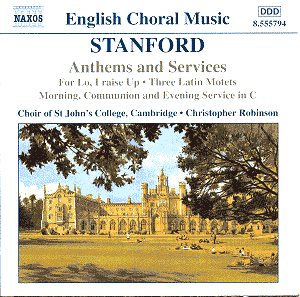Charles Villiers Stanford,
although Irish by birth, was undoubtedly
one of the most influential figures
in British music from the last century.
The teacher of Holst, Moeran, Vaughan
Williams and Howells, Stanford was the
undisputed founder of the renaissance
in English music that began in the late
nineteenth century, and continued on
through the works of Walton and Britten.
It lives still through the likes of
Oliver Knussen and Sir Peter Maxwell
Davies.
Although he composed
operas, seven symphonies, and some piano
and chamber music, it is through his
contributions to the corpus of Anglican
church music that he is best remembered
and most justifiably celebrated. With
Brahms as his musical idol, Stanford
enlivened the otherwise waning music
of the Victorian composers by using
Brahmsian devices such as a cyclical
unity in his settings of the morning,
communion and evening services, and
by giving the organ a much more prominent
and dynamic role in the music.
This recording, which
presents all the Op. 115 services in
C major, along with the Evening Service
in G, selected motets and organ works,
is outstanding in terms of the quality
of the singing, the spot-on intonation
and sensitivity to issues of phrasing
and enunciation. The all-male choir
is well balanced, and the boys sing
with a clarity and purity of tone that
is a delight to hear, never shrill or
over-produced. Christopher Whitton and
Jonathan Vaughn make fine use of the
splendid St. Johnís College Chapel organ,
providing the entire rich splendor that
is typical of English Cathedral instruments.
Mr. Whittonís solo work in the Prelude
and Postlude is taut rhythmically and
he is careful, thankfully, not to over-sentimentalize.
If one were to quibble
a bit with Mr. Robinsonís interpretations,
it would be to say that his tempo choices
in the Beati quorum via and the Magnificat
of the Service and C are a bit on the
slow side. I found that, as a result,
the forward motion of the music was
a bit compromised. But these are small
faults indeed and are quite frankly,
a matter of my own personal taste.
The Evening Service
in G is given a magnificently lyrical
performance, with solo singing by young
Oliver Lepage-Dean being of the very
highest order. Gareth Jones, although
possessed of a fine baritone voice,
has a tendency to be a bit mannered
in his delivery of the wonderful solo
in the Nunc dimittis, and seems to prefer
a rather throaty placement of his instrument
that comes across a bit gratingly, particularly
in the upper registers.
Delightfully dramatic
as the motet For lo, I raise up
is, this performance comes very close
to the "over-the-top" precipice,
but is not without its redeeming qualities
either. Robinson and the choir certainly
get the point across, giving this piece
a near operatic performance.
Sound quality is very
fine indeed, with ample capturing of
the reverberant chapel without blurring
the music into mush. Texts are completely
understandable on first hearing and
without the aid of the texts and translations,
which wisely and thankfully are included
in the booklet. Program notes by Andrew
Burn are well written and thorough.
Highly recommended.
Kevin Sutton
see also review
by Christopher Howell
